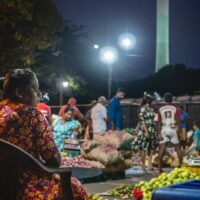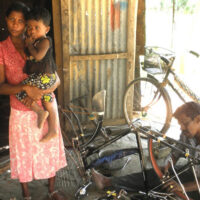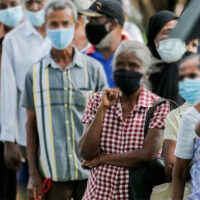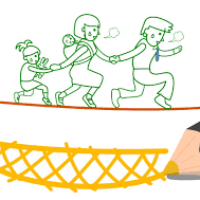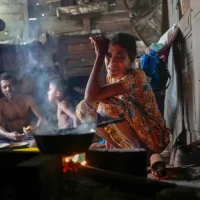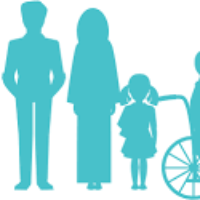Community-Based Approaches and COVID-19 – Fulfilling the Need for Innovative Approaches to Public Health
By Fiona Carter-Tod
The world has begun to adjust to living with COVID-19. In the face of previous disease crises, we have learned a lot about effective yet underemphasized aspects of an emergency public health response, such as community-based public health efforts. In the case with AIDS and SARS, research revealed that responses emerging from a community level are successful and sustainable.1 With these diseases, the sustainability of interventions by community organization facilitated participation, accountability, and action2 and indicated a potential to fill existing gaps in healthcare services.3 In the case of influenza outreach efforts, it was found that community organizations aided in addressing structural inequalities by alleviating access barriers.4 These previous health challenges illuminated the longevity, equity, and value of community level interventions. When COVID-19 rapidly became an international public health threat, researchers turned to community level interventions to implement their previous successful strategies and further research their potential.
The first case of COVID-19 was reported in Sri Lanka in January of 2020 marking the beginning of the first wave of the pandemic on the island.5 This would be followed by two subsequent wave of cases, the second beginning in September of 2020 and the the third in April of 2021.5 The public health system response heavily relied on the grassroots health unit system5 as it involved the implementation of techniques such as information dissemination, detection, cluster-based containment, reduction of social gathering and mobility of the population, isolation, treatment, and staggered relaxation of control.6 Given its success with the first wave and vaccine distribution, the nation’s COVID-19 response is well covered in literature, however, much of the information surrounding the Sri Lankan pandemic response lacks the mention of non-governmental pandemic support. This could be due to a shared distrust towards the involvement of community organizations and nongovernmental organizations (NGOs) resulting from mismanagement of aid following incidences such as the tsunami and post-war development. Despite this, thinking in line with other scholars, there needs to be a strengthening of a more positive perception of NGOs7 and an expansion of the understanding of their role, both within the context of the pandemic and beyond it.
In an effort to contribute to this understanding of community interventions during the pandemic, I interviewed ten public health professionals including NGO affiliates, government health policy employees, general practitioners, and academic researchers. In other countries such as Indonesia8, China9, Amsterdam10, Oman11, and the United States12 the role of community organizations in the COVID-19 pandemic response has been well outlined and explored. Through interviewing public health professionals, we established a better understanding of the role of these organizations and the perception of their involvement in Sri Lanka. It was primarily found that non-governmental organizations (NGOs) and community organizations assisted in the pandemic response via fundraising, the provision of dry rations and personal protective equipment (PPE) safety kits, and support for online learning. In addition, most public health professionals viewed these organizations as best being utilized to support government efforts with their innate ability for improved communication, collaboration, and innovation. This ability stems from an inherent trust built by the sustained presence of these organizations in their communities. During the pandemic this ability facilitated the effective dissemination of everchanging pandemic information, increase of public health compliance, and widespread distribution of essential items. Moving forward beyond the context of the pandemic, it will be important to see the ways in which these unique skills can be adapted to address other pressing public health issues in Sri Lanka such as the rise of noncommunicable diseases (NCDs) as well as those resulting from the current economic crisis.
To read more on the role of community organizations in Sri Lanka, the results of these interviews, as well as the potential challenges of community level interventions, see the paper linked below entitled “Communication, Collaboration, and Innovation: The Value of Community-Based Approaches to COVID-19 in Sri Lanka.”
Read full paper here.
References
- Routte, Irene, et al. “Refugee-Led Organizations’ Crisis Response During the COVID-19 Pandemic.” Refuge: Canada’s Journal on Refugees/Refuge: Revue canadienne sur les réfugiés 38.1 (2022): 62-77.
- Rachmawati, Emma, et al. “The roles of Islamic Faith-Based Organizations on countermeasures against the COVID-19 pandemic in Indonesia.” Heliyon 8.2 (2022): e08928.
- Widmer, Mariana, et al. “The role of faith-based organizations in maternal and newborn health care in Africa.” International Journal of Gynecology & Obstetrics 114.3 (2011): 218-222.
- DeBruin, Debra, Joan Liaschenko, and Mary Faith Marshall. “Social justice in pandemic preparedness.” American journal of public health 102.4 (2012): 586-591.
- Rajapaksa, Lalini C., Padmal De Silva, and Palitha Abeykoon. “COVID-19 health system response monitor: Sri Lanka.” (2022).
- Weerasinghe, M. C. “Co-existing with COVID-19: Engaging the community to strengthen the public health response in Sri Lanka.” (2020).
- Akurugoda, Indi Ruwangi. The politics of local government and development in Sri Lanka: An analysis of the contribution of non-governmental organisations (NGOs). Diss. University of Waikato, 2014.
- Rachmawati, Emma, et al. “The roles of Islamic Faith-Based Organizations on countermeasures against the COVID-19 pandemic in Indonesia.” Heliyon 8.2 (2022): e08928.
- Cheng, Yuan, et al. “Coproducing responses to COVID‐19 with community‐based organizations: lessons from Zhejiang Province, China.” Public Administration Review 80.5 (2020): 866-873.
- Roels, Nastasja Ilonka, et al. “Confident futures: Community-based organizations as first responders and agents of change in the face of the Covid-19 pandemic.” Social Science & Medicine 294 (2022): 114639.
- Al Siyabi, Huda, et al. “Community participation approaches for effective national covid-19 pandemic preparedness and response: an experience from Oman.” Frontiers in public health (2021): 1044.
- Routte, Irene, et al. “Refugee-Led Organizations’ Crisis Response During the COVID-19 Pandemic.” Refuge: Canada’s Journal on Refugees/Refuge: Revue canadienne sur les réfugiés 38.1 (2022): 62-77.
